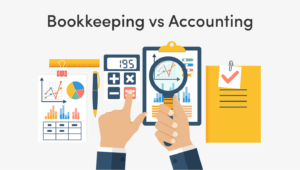Bookkeeping
In order to maintain a business, it is essential to have a good understanding of bookkeeping basics. This article will outline the basics of bookkeeping, including what it is, why it is important, and how to get started. By understanding the fundamentals of bookkeeping, business owners can keep their finances in order and make informed decisions about their company’s future.
What is Bookkeeping?
Bookkeeping is the process of recording, classifying, and summarizing financial performance and transactions to provide information that is useful in making business decisions. The three basic bookkeeping activities are record-keeping, posting, and trial balance.
The term “bookkeeper” can refer to either the person who performs the activities of bookkeeping or the accounting software used to perform many of the tasks of bookkeeping automatically.
The bookkeeping process begins with recording a business’s financial transactions in accounting journals. The transactions are then posted to a ledger, which records all the accounts in the business. The general ledger contains all account balances, as shown in the trial balance.
The bookkeeping process provides information that is useful in making business decisions. The financial statements are among the essential products of the bookkeeping process. The income statement shows the business’s revenue and expenses for a period of time, and the balance sheet shows the business’s assets, liabilities, and equity at a point in time.
Also read – The Ultimate Guide to Expense Management

Image Credit: vocal.media
Why is Bookkeeping Important?
Bookkeeping is essential because it provides financial information about a business that can be used to make sound decisions. Managers can use this financial information internally to make informed decisions about where to allocate resources or externally by investors and creditors to assess risk.
There are a number of specific reasons why bookkeeping is so important, which we will explore in more detail below.
1. Record financial transactions
Bookkeeping provides a written record of all the financial transactions that have taken place within a business. This record can track the inflow and outflow of funds and identify patterns and trends over time. This information can be extremely useful in forecasting future cash flow statements and budgeting for future expenditures. You can also use single-entry or double-entry bookkeeping to record transactions.
2. It helps to identify areas of expenditure
By tracking all expenditures, bookkeeping can help to identify areas where a business is spending too much money. This information can change how resources are allocated to reduce costs and improve efficiency.
3. It can help to prevent fraud
Businesses can more easily identify any unusual or suspicious activity by having a written record of all financial transactions. This information can then be used to investigate any potential fraud or theft and take active steps to make sure that it does not occur again.
4. It provides evidence of income and expenditure
Bookkeeping can provide evidence of a business’s income and expenditure, which can be helpful in a number of different situations. For example, if a business is audited by the tax authorities, having accurate and up-to-date records will make it easier and help avoid penalties.
5. It can help to assess business performance
By tracking financial information over time, bookkeeping can also help businesses to assess their overall performance. This information is used to identify where the business is doing well and areas where there is room for improvement.
There are many reasons why bookkeeping is important for businesses of all sizes. Accurate financial transaction records can help make sound decisions, prevent fraud, and assess business performance. Bookkeeping is, therefore, an essential part of running a successful business.
Also Read – What is Spend Management?
Methods of Bookkeeping
There are two primary bookkeeping methods: the single-entry and double-entry systems.
1. Single Entry Bookkeeping
Under the single entry system, transactions are only recorded as debits or credits to one account. Small businesses and individuals typically use this system because it is simple to set up and maintain. With the single entry system, there is no need to prepare journal entries or post them to ledger accounts. Instead, transactions are recorded in a chequebook register, and the running balance in the register is used to reconcile the bank account statement.
While the single entry system is easy to use, it has some limitations:
- It does not provide a complete record of all business transactions.
- It is difficult to track where all the money is going and how it is being spent.
- The single entry system does not provide a way to easily see the business’s financial position.
Despite its limitations, the single entry system can be a helpful tool for small business owners and individuals. Always remember that this system should not be used by businesses that are required to maintain double-entry accounting records.
2. Double Entry Bookkeeping
The double entry bookkeeping system is a process of bookkeeping where every transaction is recorded in at least two different accounts. The double entry bookkeeping method is thought to have originated in Italy in the 14th century, and it is still used by businesses today.
Two types of accounts in double-entry accounting are assets and liabilities. Assets are anything a business owns, such as cash, inventory, or equipment. Liabilities are anything that a business owes, such as loans or credit card debt.
Every transaction affects both an asset and a liability account. For example, if a business buys $100 of office supplies on credit, the accounts affected would be Accounts Receivable (an asset) and Accounts Payable (a liability). The double entry bookkeeping method is a way to keep track of all the different financial transactions that a business conducts.
The double entry bookkeeping method can be daunting for small businesses, but there are software programs that can help. QuickBooks is one example of accounting software that can help businesses keep track of their finances using the double-entry bookkeeping method.
Also Read – A Completed Guide To Invoice Financing
Ways to Record Entries in Bookkeeping
In bookkeeping, accuracy in recording entries is crucial. This may seem daunting, but some simple steps can be followed to ensure accuracy. Here are some tips on ways to record entries in bookkeeping:
1. Keep a detailed journal
A journal is a key tool in bookkeeping and can be used to record all transactions. Be sure to date each entry and include a description of the transaction. This will help you keep track of your finances and ensure accuracy when recording entries.
2. Accounting software
Accounting software can be a helpful tool when recording entries. This software can automate many tasks associated with bookkeeping, including entry recording. Be sure to choose bookkeeping software compatible with your business expenses and needs.
3. Utilize templates
There are numerous templates online to keep track of entries. These templates can be customized to fit your specific bookkeeping needs. Utilizing a template can help to ensure accuracy and save time when recording entries.
4. Hire a professional
If you are unsure how to correctly record entries, consider hiring an experienced bookkeeper. A bookkeeper can provide guidance and support in ensuring accuracy and keeping track of your finances.
Following these tips, you can ensure accuracy when recording entries in your bookkeeping. Keeping a detailed journal, accounting software, and templates can save time and reduce the risk of error. If you are still unsure about correctly recording entries, consider hiring a professional bookkeeper. Bookkeeping can provide the guidance and support needed to ensure accuracy and keep track of your finances.
Also Read – A Business Guide To Operating Expenses (OpEx)
Bookkeeping Best Practices
There is no definitive answer to what bookkeeping best practices are. However, a few key things that any small business owner or bookkeeper should remember are to ensure accurate and efficient bookkeeping.
Firstly, it is important to maintain accurate records. This means keeping track of all financial transactions, no matter how small. Inaccurate or missing information can lead to errors in financial statements and tax returns, ultimately costing the business money.
Another important bookkeeping best practice is to stay organized. This means keeping track of cash receipts, invoices, and other documentation in an easily accessible place. When everything is organized, it is much easier to find what you need when you need it. This can save time and frustration down the road.
Lastly, keeping up with tax laws and accounting standards changes is important. These changes can significantly impact bookkeeping practices, so staying up-to-date on the latest developments is important. You can do this by reading newsletters or blogs, attending seminars and workshops, or enrolling in courses presented by professional organizations.
By following these bookkeeping best practices, business owners can ensure that their books are accurate and up-to-date. In the long run, this can save them both time and money.
Also Read – Corporate Travel Management
Bookkeeping vs Accounting
There is a lot of confusion regarding the difference between bookkeeping and accounting. Many people think that bookkeeping and the accounting process are the same, but there are some very important differences between the two. Here is a look at the difference between bookkeeping and accounting system:
Accounting is the process of recording, classifying, and summarizing a company’s financial transactions to provide helpful information for business decisions. Accounting is much broader than bookkeeping and includes tax preparation, auditing, and financial planning.
Bookkeeping is the process of recording financial transactions in a company’s books of account. Bookkeepers are responsible for ensuring that all transactions are recorded accurately and in a timely manner. They also prepare financial reports and statements for management.
While bookkeeping and accounting are both important financial tools, they serve different purposes. The accounting equation is primarily concerned with providing valuable information in making business decisions, while bookkeeping focuses on recording financial transactions accurately.
Also Read – Bookkeeping vs Accounting

Image Credit: financepal.com
Understanding Financial Statements
Most people will imagine a company’s balance sheet and income statement when they think of a financial statement. However, there is much more to financial statements than just these two documents. A complete set of financial statements will also include a statement of cash flows and a statement of equity. These four documents provide an overview of a company’s financial health and performance.
a) The balance sheet
It is a snapshot of a company’s asset accounts, liabilities, and equity at a specific time. It shows how much a company is worth, what the business owns (assets), and what it owes (liabilities). The equity portion of the balance sheet represents the ownership interest of the company’s shareholders.
b) The income statement
It shows a company’s revenue and expenses over a specific period, usually one year. It reveals how much profit and loss statement a company made during that time.
c) The statement of cash flows
It shows a company’s cash inflow and outflow over a specific period. It tracks a company’s cash position and identifies any potential cash flow statement problems.
d) The statement of equity
It shows the changes in a company’s equity over a specific period of time. It is used to track the progress of a company’s share price and to identify any shareholder dilution that may have occurred.
Understanding these four financial statements is essential for anyone who wants a clear picture of a company’s financial health and performance. They can assess a company’s past performance, anticipate its prospects, and make informed investment decisions.
Read also – A Comprehensive Guide to Creating an Expense Report
Bookkeeping for Enterprise vs. Bookkeeping for Small Businesses
Bookkeeping is keeping track, classifying, and summarizing financial transactions to provide information that may help you make business decisions. The types of bookkeeping systems used by businesses vary depending on the size and complexity of the business, as well as the specific industry.
Enterprise bookkeeping refers to the accounting practices used by large businesses, typically more complex than those used by small businesses. Enterprise bookkeeping systems are designed to manage a large volume of transactions and support the decision-making process of senior managers.
On the other hand, small business administration bookkeeping systems are typically less complex and easier to use. They also tend to be less expensive than enterprise bookkeeping systems. Finally, small business bookkeeping systems often provide information that is more useful for day-to-day decision-making than enterprise bookkeeping systems.
When choosing a bookkeeping system for your business, it is important to consider the specific needs of your business. Consider a small business bookkeeping system if you run a small company. However, you may consider an enterprise bookkeeping system if you are a large business owner.

Image Credit: hellobrigade.com
No matter what type of bookkeeping system you choose, it is essential to keep accurate records. Inaccurate records can lead to costly mistakes and cause your business to lose money. Therefore, selecting a bookkeeping system that is easy to use and provides accurate information is essential.
There are a number of different bookkeeping systems available on the market today. You can choose from software-based bookkeeping systems, web-based bookkeeping systems, or even paper-based bookkeeping systems.
When selecting a bookkeeping system, it is essential to compare the features and benefits of each system. It is important to consider the cost of the bookkeeping system. You should also ensure that the bookkeeping system you select is compatible with your accounting software.
Finally, when selecting a bookkeeping system, it is essential to read reviews of the different bookkeeping systems. This will help you choose a system that is right for your business.
Also Read – 7 Reasons To Automate Your Expense Management
Conclusion
Bookkeeping is an essential aspect of every business, regardless of size. Understanding the basics of bookkeeping and following best practices ensures your financial records are accurate and up-to-date. In conclusion, bookkeeping is an important part of any business. By understanding the basics of bookkeeping, you can ensure that your finances are in order and make sound financial decisions for your business.







